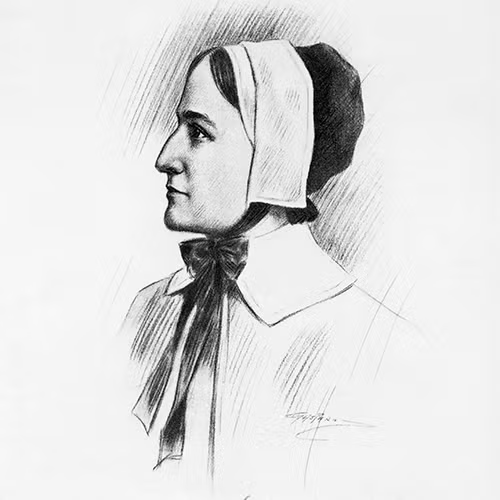
Table of Contents
Who Was Anne Hutchinson?
Anne Hutchinson was a key figure in early American history, known for her strong religious convictions and her role in challenging the established Puritan clergy of the Massachusetts Bay Colony. Born in Alford, England, she was deeply influenced by her father, a deacon who encouraged her to critically examine the teachings of the Church of England. In 1634, Hutchinson and her husband, William, followed Protestant minister John Cotton to the Massachusetts Bay Colony, where she began sharing her interpretations of Cotton’s sermons, which conflicted with the views of the colony’s religious leaders. Her outspoken nature led to a trial for heresy, during which she was interrogated by Governor John Winthrop. Found guilty of defying the religious norms of the colony, Hutchinson was exiled. Tragically, she was later killed in 1643 during a massacre by Native Americans.
Early Life
Anne Hutchinson, born Anne Marbury in 1591 in Alford, Lincolnshire, England, was baptized on July 20 of that year. Raised in a household that valued education and free thinking, she was the daughter of Francis Marbury, a clergyman who had been censured by the Anglican Church for his outspoken criticisms. Her father’s emphasis on intellectual independence and her mother Bridget’s knowledge of herbal medicine shaped Hutchinson’s inquisitive and self-reliant character. In 1612, Anne married William Hutchinson, a prosperous merchant, and together they became followers of John Cotton, a prominent Anglican minister whose teachings deeply influenced her spiritual beliefs.
Finding Religion in North America
Like many Puritans of his time, John Cotton faced suppression for his religious beliefs within the Protestant-led Church of England. In 1633, he migrated to the Massachusetts Bay Colony. A year later, Anne Hutchinson and her husband followed. While the colony was founded on the principle of religious freedom, its first governor, John Winthrop, envisioned a “city upon a hill” characterized by Christian unity and order. Adherence to the leadership of the elders was paramount, and women, in particular, were expected to play a submissive and supportive role.
After settling in Boston, Hutchinson became a midwife and herbalist. She also held weekly meetings in her home to discuss the sermons of local ministers, sometimes attracting crowds of 60 to 80 people. Hutchinson advocated a spirit-centered theology, asserting that God’s grace could be granted through faith alone. This stood in stark contrast to the Puritan ministers’ orthodox teachings, which emphasized adherence to biblical commandments and good deeds. Concerned about maintaining control and protecting their role as the sole interpreters of scripture, the colony’s leaders swiftly moved to confront any deviation from their rigid doctrine. These growing tensions became known as the Antinomian Controversy.
Conflict and Trial
As Hutchinson’s influence grew, the colony’s magistrates perceived her as a threat to their authority. In 1637, Governor John Winthrop charged her with sedition and heresy. During her trial in November of that year, Hutchinson was personally interrogated by Winthrop, who accused her of defaming the ministers by questioning their biblical teachings. Hutchinson responded defiantly, challenging his claims and turning his accusations into opportunities to defend herself. Winthrop was deeply offended by her boldness, particularly her public role in teaching men, which he declared “not fitting for your sex.” Hutchinson defended her actions by citing the Bible, specifically the book of Titus, which encouraged older women to teach the younger.
However, Hutchinson’s downfall came when she claimed that her revelations came directly from God, a statement that the magistrates interpreted as heresy. Seizing upon this declaration, the court swiftly condemned her, leading to her banishment from the colony.
Final Years and Death
On March 22, 1638, Hutchinson was excommunicated from the Church of Boston and banished from the Massachusetts Bay Colony. Along with her husband, she relocated to what is now Portsmouth, Rhode Island, where they joined Roger Williams, another advocate for religious tolerance. After her husband’s death in 1642, Hutchinson moved to Long Island Sound, then under Dutch jurisdiction, in an effort to escape further persecution from Massachusetts authorities. In 1643, conflict with the local Siwanoy Native American tribe led to the tragic deaths of Hutchinson, most of her children, and her servants.
The reaction in Massachusetts was cold and unsympathetic, with many interpreting Hutchinson’s death as divine judgment for her defiance.
Though modern interpretations often view Hutchinson as a symbol of religious freedom and women’s rights, she was neither a deliberate advocate for these causes. Rather, within the social and political constraints of her time, she was a courageous woman who spoke her mind and followed her conscience, even in the face of overwhelming opposition.
